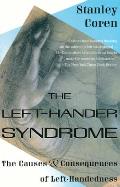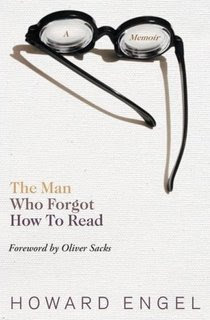Neuroscience and Behavior
Stanley Coren (1993). The Left-Hander Syndrome: The Causes and Consequences of Left-Handedness. |
||
 |
If you are among the 10 percent of people who happen to be left-handed, you've had to endure such derisive terms as "gauche" and "a left-handed compliment." At school you may have been forced to write with your right hand. And in another century your proclivity might have gotten you accused of witchcraft. Review by Christopher Lehmann-Haupt, New York Times: http://www.nytimes.com/1992/01/23/books/books-of-the-times-sinister-aspects-of-left-handedness.html?pagewanted=all&src=pm |
|
Howard Engel and Oliver Sacks (2008). The Man Who Forgot How to Read: A Memoir. |
||
 |
The award-winning author of the Benny Cooperman mystery series recounts the loss of his ability to comprehend the written language after suffering a stroke, a devastating setback after which he learned to read again. Interview by Neal Conan, NPR: http://www.npr.org/templates/story/story.php?storyId=92875639 |
|
Robert M. Julien (2001). A Primer of Drug Action: A Concise, Non-Technical Guide to the Actions, Uses, and Side Effects of Psychoactive Drugs.. |
||
 |
Since 1975, Robert Julien's A Primer of Drug Action has been the definitive guide to the effects of psychoactive drugs on the brain and on behavior. Now fully updated, this popular guide continues to lead the way through a rapidly changing field, providing readers with a clear, contemporary, and objective look at every drug and medication that either positively or adversely affects brain function. Review by Julien, Advokat and Comaty, The Psychology Times: http://thepsychologytimes.com/2011/05/19/a-primer-of-drug-action-julien-advokat-and-comaty/ |
|
Malcolm Macmillans (2002). An Odd Kind of Fame: Sotries of Phineas Gage. |
||
 |
In 1848 a railway construction worker named Phineas Gage suffered an accident that made him a major curiosity of medicine and a significant figure in psychology and neuroscience: an explosion caused a tamping iron to be blown completely through his head, destroying the left frontal lobe of his brain. Gage survived the accident and remained in reasonable physical health for another eleven years. But his behavior changed markedly after the injury, and his case is considered to be the first to reveal the relation between the brain and complex personality characteristics. Review by Daniel Tranel, Ph.D., New England Journal of Medicine: http://www.nejm.org/doi/full/10.1056/NEJM200101253440419 |
|
V. S. Ramachandran (2011). The Tell-Tale Brain: A Neuroscientist's Quest for What Makes Us Human . |
||
 |
The "Marco Polo of Neuroscience" traces the links between neurology and behavior and discusses how normal brain function evolves through the examination of several baffling and extreme case studies and describes a new direction for the treatment Review by Anthony Gottlieb, New York Times: http://www.nytimes.com/2011/01/30/books/review/Gottlieb-t.html?pagewanted=all |
|
V. S. Ramachandran, Sandra Blakeslee and Oliver Sacks (1999). Phantoms in the Brain: Probing the Mysteries of the Human Mind. |
||
 |
Explores the vast complexities of the human brain and how it works, drawing on real-life case studies of patients suffering from unusual neurological afflictions to explain what occurs in the brain. Review by Jim Walker, Nobeliefs.com: http://nobeliefs.com/Ramachandran.htm |
|
Christopher Ryan and Cacilda Jetha (2011). Sex at Dawn: How We Mate, Why We Stray, and What It Means for Modern Relationships. |
||
 |
In this controversial, thought-provoking, and brilliant book, renegade thinkers Christopher Ryan and Cacilda JethÁ debunk almost everything we “know” about sex, weaving together convergent, frequently overlooked evidence from anthropology, archaeology, primatology, anatomy, and psychosexuality to show how far from human nature monogamy really is. In Sex at Dawn, the authors expose the ancient roots of human sexuality while pointing toward a more optimistic future illuminated by our innate capacities for love, cooperation, and generosity. Review by Ellen McCarthy, Washington Post: http://www.washingtonpost.com/wp-dyn/content/article/2010/05/27/AR2010052706046.html |
|
Oliver Sacks (1996). An Anthropologist On Mars: Seven Paradoxical Tales. |
||
 |
To these seven narratives of neurological disorder Dr. Sacks brings the same humanity, poetic observation, and infectious sense of wonder that are apparent in his bestsellers Awakenings and The Man Who Mistook His Wife for a Hat. These men, women, and one extraordinary child emerge as brilliantly adaptive personalities, whose conditions have not so much debilitated them as ushered them into another reality.
Review by Selena, goodreads.com: http://www.goodreads.com/review/show/119155618 |
|
Oliver Sacks (1999). Awakenings. |
||
 |
Awakenings--which inspired the major motion picture--is the remarkable story of a group of patients who contracted sleeping-sickness during the great epidemic just after World War I. Frozen for decades in a trance-like state, these men and women were given up as hopeless until 1969, when Dr. Oliver Sacks gave them the then-new drug L-DOPA, which had an astonishing, explosive, "awakening" effect. Dr. Sacks recounts the moving case histories of his patients, their lives, and the extraordinary transformations which went with their reintroduction to a changed world.
Review by Nuthatch, Blogcritics: http://blogcritics.org/books/article/book-review-oaxaca-journal-by-oliver/ |
|
Oliver Sacks (2007). Musicophilia: tales of music and the brain. |
||
 |
Drawing on the individual experiences of patients, musicians, composers, and everyday people, the author of Awakenings explores the complex human response to music, detailing the full range of human reactions to music.
Review by Alfred A. Knopf, New York Times: http://www.nytimes.com/2007/10/30/arts/30iht-31book.8113015.html |
|
Oliver Sacks (1998). The man who mistook his wife for a hat and other clinical tales. |
||
 |
Presents a series of stories about men and women who, representing both medical and literary oddities, raise fundamental questions about the nature of reality. Review by New York Times: https://www.nytimes.com/books/98/12/06/specials/sacks-mistook.html |
|
Oliver Sacks (2004). Vintage Sacks. |
||
 |
Dubbed “the poet laureate of medicine” by The New York Times, Oliver Sacks is a practicing neurologist and a mesmerizing storyteller. His empathetic accounts of his patients’s lives—and wrily observed narratives of his own—convey both the extreme borderlands of human experience and the miracles of ordinary seeing, speaking, hearing, thinking, and feeling.
Review by Dr. Justin Marley, The Amazing World of Psychiatry blog: http://theamazingworldofpsychiatry.wordpress.com/2009/03/26/vintage-sacks/ |
|
Portraits of the Mind: Visualizing the Brain from Antiquity to the 21st Century |
||
| Carl Schoonover, Jonah (FRW) Lehrer - 2010 - No preview available |
|
|
Gay, Straight, and the Reason Why: The Science of Sexual Orientation |
||
| Simon LeVay - 2010 - Psychology - Limited preview What causes a child to grow up gay or straight? In this book, neuroscientist Simon LeVay summarizes a wealth of scientific evidence that points to one inescapable conclusion: Sexual orientation results primarily from an interaction between genes ...
|
|
|
You Don't Look Like Anyone I Know |
||
| Heather Sellers - 2010 - No preview available |
|
|
Sleights of Mind: What the Neuroscience of Magic Reveals about Our Everyday ... |
||
| Stephen Macknick, Susana Martinez-Conde, Sandra Blakeslee - 2010 - No preview available |
|
|
|
|
||
| |
|
|
The age of empathy: nature's lessons for a kinder society |
||
| Frans B. M. Waal - 2009 - Family & Relationships - No preview available |
|
|
The Price of Altruism: George Price and the Search for the Origins of Kindness |
||
| Oren Harman - 2010 - Biography & Autobiography - Limited preview Describes the intellectual journey of eccentric American genius George Price, who tried to answer the evolutionary riddle of why people are nice, and eventually gave away all his belongings and took his own life in a squatters flat.
|
|
|
Beyond the zonules of Zinn: a fantastic journey through your brain |
||
| David Bainbridge - 2008 - Medical - Limited preview Describes the structure, function, and evolution of the brain.
|
|
|
Head Cases: Stories of Brain Injury and Its Aftermath |
||
| Michael Paul Mason - 2009 - Medical - Limited preview Head Cases takes us into the dark side of the brain in an astonishing sequence of stories, at once true and strange, from the world of brain damage. Michael Paul Mason is one of an elite group of experts who coordinate care in the complicated ...
|
|
|
Welcome to Your Brain: Why You Lose Your Car Keys But Never Forget How to ... |
||
| Sandra Aamodt, Sam Wang - 2008 - No preview available |
|
|
The Migraine Brain: Your Breakthrough Guide to Fewer Headaches, Better Health |
||
| Carolyn Bernstein, Elaine McArdle - 2009 - Medical - Limited preview Draws on the latest scientific findings to identify the unique characteristics, chemical makeups, and structural differences of migraine-prone brains, offering insight into the role of the central nervous system while outlining a comprehensive ...
|
|
|
Head games: football's concussion crisis from the NFL to youth leagues |
||
| Christopher Nowinski - 2006 - Medical - Limited preview America's favorite sport has a serious problem. Many of the NFL's top players--including Troy Aikman, Steve Young, Merril Hoge, Ted Johnson, Al Toon, and Wayne Chrebet--have had their careers ended by head injuries. But few realize that most NFL ...
|
|
|
Losing My Mind: An Intimate Look at Life with Alzheimer's |
||
| Thomas DeBaggio - 2003 - No preview available |
|
|
Forever Today: A True Story of Lost Memory and Never-Ending Love |
||
| Deborah Wearing - 2006 - No preview available |
|
|
A man without words |
|
| Susan Schaller, Oliver W. Sacks - 1995 - Language Arts & Disciplines - Limited preview For more than a quarter of a century, Ildefonso, a Mexican Indian, lived in total isolation, set apart from the rest of the world. He wasn't a political prisoner or a social recluse, he was simply born deaf and had never been taught even the most ...
|
|

Doidge, N. (2007). The brain that changes itself: Stories of personal triumph from the frontiers of brain science. Viking.
Eleven stories of how the brain changes itself. Here are two interviews from ABC's All in the Mind:
The Power of Plasticity, Parts 1 and 2
http://www.normandoidge.com/normandoidge/AUDIO_INTERVIEWS.html
This book has also sparked a documentary, for more information, see http://www.cbc.ca/documentaries/natureofthings/2008/brainchangesitself/
Taylor, J. B. (2006). My Stroke of Insight - "Jill Bolte Taylor was a 37-year-old Harvard-trained and published brain scientist when a blood vessel exploded in her brain. Through the eyes of a curious neuroanatomist, she watched her mind completely deteriorate whereby she could not walk, talk, read, write, or recall any of her life. Because of her understanding of how the brain works, her respect for the cells composing her human form, and an amazing mother, Jill completely recovered her mind, brain and body. In My Stroke of Insight: A Brain Scientist's Personal Journey, Jill shares with us her recommendations for recovery and the insight she gained into the unique functions of the right and left halves of her brain."
Read more about this book from the author's website or watch her presentation at TED.
A Primate's Memoir: A Neuroscientist's Unconventional Life Among the Baboons. (2002).